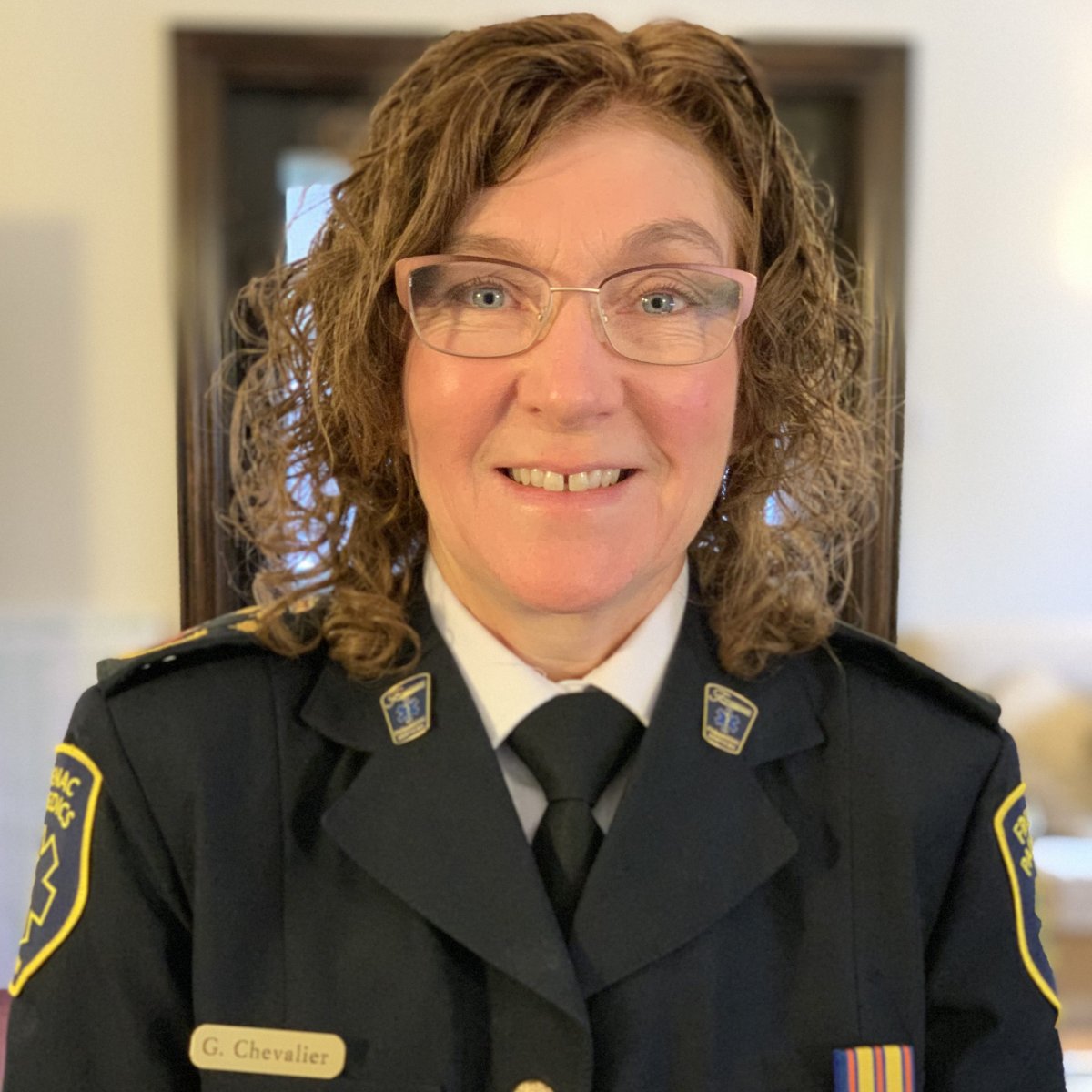It’s been a big year for Gale Chevalier, who was named chief of Frontenac Paramedic Services in April and officially took over in July.

The veteran paramedic had served as deputy chief for most of the last decade, and has spent her whole career as a paramedic in the Kingston region.
Now that she’s chief, she says she hopes to continue and expand on former chief Paul Charbonneau’s work. She aims to ensure the mental health needs for her team are met, considering the extreme stress of the job, and to better serve the population by trying to be a leader in the way “paramedicine” is practised in the Frontenac area.
Q: What were you doing in 2010?
A: Professionally, in 2010, I became deputy chief of Frontenac Paramedics, the organization where I have spent my entire 25-year paramedic career. Personally, I completed my first Ironman Triathlon in Lake Placid that year.
Q: How were you hoping things might shape up in your community over the decade?
A: Focussing on the paramedic community, I hoped to see paramedic services continue to evolve and change as they have so much over the past 20 years. We have advanced so far from just putting patients on a stretcher and driving fast to the hospital, to now bringing critical emergency care right to the patient.
- Posters promoting ‘Steal From Loblaws Day’ are circulating. How did we get here?
- Video shows Ontario police sharing Trudeau’s location with protester, investigation launched
- Canadian food banks are on the brink: ‘This is not a sustainable situation’
- Solar eclipse eye damage: More than 160 cases reported in Ontario, Quebec
My hopes included finding ways that paramedics can become part of the bigger health care picture. Ten years ago, we started to hear about “community paramedicine.” This was a new idea where paramedics and their skills can be used in a different way to help people stay well in their own homes to decrease 911 calls and visits to the emergency department. I also want Frontenac Paramedics to continue to be leaders in new initiatives.

Q: Were you right or wrong?
A: I believe I was right. We have identified the need for community paramedicine programs in our community and we began to implement them. Innovative community paramedicine programs have been developed across our province, country, and overseas. These programs are unique to each community, helping to keep people healthy and safe in their own homes and to decrease the need for 911 calls and hospital visits.
As well, there have been recent changes to the Ambulance Act that will allow paramedic services to develop programs where patients can be assessed and transported to facilities, or to be referred to appropriate services other than emergency departments. These programs will help patients get the right care that they need.
Q: What is the single biggest change that has happened in the local paramedic service over the past 10 years that has been a gamechanger?
A: I’d have to say that the biggest game-changer for our paramedics has been the implementation of power stretchers. In 2016, Frontenac Paramedics was a leader among Ontario paramedic services when we replaced all our manual stretchers with power stretchers and power load systems for our ambulances. These stretchers reduce the strain on paramedics from physically lifting multiple patients multiple times every shift. These stretchers have significantly reduced lifting-related injuries and paramedics have said to me that they know their use will extend their careers.
Q: What has been your biggest win?
A: Personally, my biggest win was when I was given the opportunity to lead this great organization as chief in July this year. I am so honoured to lead our skilled paramedics who are out in the community every day helping people in need.
For our organization, I am proud of the work we are doing addressing paramedic mental wellness. This is a very important issue that has not been adequately addressed in emergency services over the years.
Thankfully, it is being recognized globally that this profession takes a toll on the men and women who do the paramedic job. I helped Frontenac Paramedics form their peer support team in 2012. Peer support team members receive training that allows them to recognize and help their peers who may be having challenges coping with the work they do. As well, we have increased the psychological benefits available to staff and have recently contracted psychologists to provide services, including wellness checks and counselling to our paramedics. This is just a start and a lot more needs to be done, but I am glad we are taking positive steps.

Q: What has been your biggest disappointment or miss? What did you learn from it?
A: My biggest disappointment has been watching colleagues struggle with the stresses that come with this profession, and knowing we are still not doing enough to help them. Often, we miss the early signs and people suffer. We need research focused on determining how to best help paramedics and other first responders cope with this difficult job. This is why I have felt it so important to implement our peer support team and bring on additional psychological supports.
Q: What was the biggest story, from a paramedic chief’s point of view, of the last decade in Kingston? Why?
A: The biggest story is the recent announcement by the provincial government regarding the intention to restructure paramedic services. Reducing the number of paramedic services provincially, which is part of the proposed changes, will impact the delivery of services in the city of Kingston and county of Frontenac.
Fortunately, the government has taken a step back and is now conducting consultations across the province to better understand these impacts. In the meantime, the uncertainty of the future delivery models has made it difficult to move ahead with plans for additional paramedic resources and stations.
Q: How has the make-up of the Kingston region changed over the last decade? How does this drive your decisions?
A: We continue to see an aging population, not unlike other communities, and we will continue to see this aging population throughout our region. This will put increasing pressures on paramedics, as well as hospitals, long-term care facilities, and other health care organizations — all of which plays an interconnected role with paramedic resources.

Frontenac Paramedics recently completed a 10-year staffing and resource study, and it illustrates how an increasing demand for services is affected by, in part, and ageing population. The increasing call demands for paramedics, coupled with our aging population and geography, are considerations for how Frontenac Paramedics will need to respond and allocate resources.
Q: What’s your biggest hope for the paramedic service for the upcoming decade?
A: There are many potential changes coming to how paramedic services will operate. I hope to see our system evolve so that not every person who calls 911 ends up with an ambulance trip to an emergency department. My biggest hopes are that we will be able to obtain the resources required to continue to provide excellent care to our community and that we can provide increased supports for paramedic mental wellness.
Q: What is the biggest challenge facing Frontenac Paramedics over the next decade?
A: The biggest challenges are going to be the continued increasing call volume, obtaining stable funding so we can ensure adequate paramedic resources and programs, and ensuring the mental wellness of our paramedic staff.




Comments